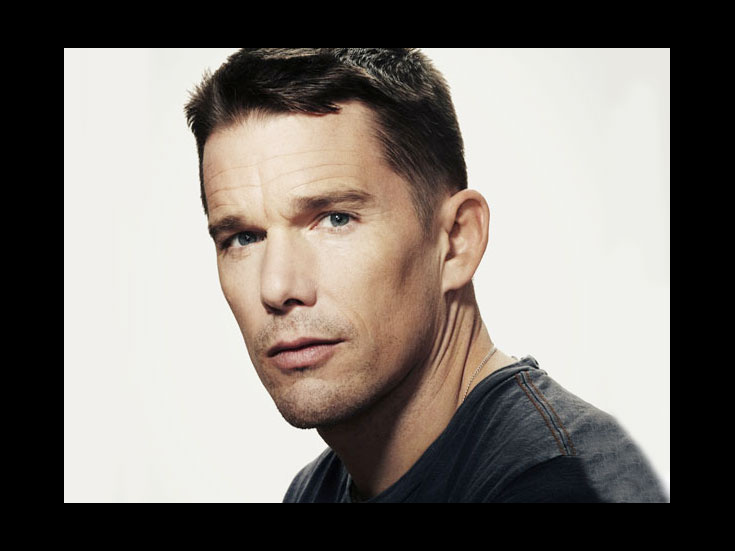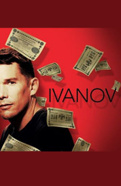Ivanov Star Ethan Hawke Recalls Theatrical Adventures With Shakespeare, Shepard, Stoppard & More
As an Oscar nominee for both acting (Training Day) and writing (Before Sunset)—not to mention a Gen X icon for Dead Poets Society and Reality Bites—Ethan Hawke could fill a couple of Role Call features with his memorable screen performances. But Hawke’s stage work is just as impressive, and he would much rather ponder which productions to highlight in a career that includes Shakespeare, Williams, Shepard, Rabe, Stoppard and now the title role in Chekhov’s Ivanov at Classic Stage Company. “The idea that movies are immortal is patently false,” Hawke declares. “Everything ages; everything passes. But the production we did of Henry IV hasn’t changed a day—and when people tell me they saw it, or the marathon of The Coast of Utopia, I want to hug them. It’s something we did together, and that never dies.” If you’ve never experienced Hawke’s magnetism and ease on stage, head downtown to see him in Ivanov.
 Role That Was the Most Passionate
Role That Was the Most Passionate
“When [director] Jack O’Brien asked me to play Hotspur in Henry IV [2003], I had never read the play. I had done a film of Hamlet that Jack loved, and he had a vision of me in this role; I wanted to play Prince Hal, but Jack was right. The name says it all: Hotspur is literally a spitfire. Every sentence the guy speaks practically has an exclamation point after it. I looked at him as the original rock star warrior. It was the first time I had done Shakespeare on stage, and the entire process was a giant learning curve. I learned all about Sean Connery’s Hotspur, Laurence Olivier’s Hotspur—it’s one of the great roles, and it came at the perfect moment in my life.”
 Role That Was the Biggest Challenge
Role That Was the Biggest Challenge
“The [three play] marathons of The Coast of Utopia [2006; Tony nomination for Best Featured Actor] were certainly the biggest challenge, because they started at 11:30 in the morning and went down at 11:30 at night. We were served two meals backstage—I’ve never done anything like that in my life, nor have many other people! Michael Bakunin was an endlessly fascinating human being to explore. He was the founding father of anarchy and one of Tom Stoppard’s most fantastic portraits of an amazing, ludicrous, maniacal human being. The key thing about that experience was getting to play someone over a lifetime; I played him from age 20 to 60, which was thrilling. Stoppard was with us the entire time, working on the plays—everything about that experience was magical.”
 Role That Was the Biggest Party
Role That Was the Biggest Party
Hurlyburly [2005, as Eddie] is a really insightful portrait of lost men. I’ve been to Hollywood, so I’ve met losers like Eddie [a casting director and enthusiastic drug user]. There’s this cloud of narcissism and self-hatred men can get into that turns into misogyny. Our production was a less glamorized version of the 80s, and that’s when you know a play is great—when it can handle that transition and become relevant to a new generation. Every performance was like a rock concert: We added a scene that [original director] Mike Nichols had cut, and yet our production ran 45 minutes shorter because of the ferocity with which we attacked it. We weren’t indulgent, we just ramped it up, and three hours went by like a Jimi Hendrix guitar solo. I was working with Josh Hamilton and Bobby Cannavale and Parker Posey—everybody could act. It was thrilling.”
 Role That Was a Dream Come True
Role That Was a Dream Come True
“If I had to pick a defining moment when I realized that [acting] was the life I wanted, it was when I was 13 and saw John Malkovich and Gary Sinise in True West. So to be invited to be part of Steppenwolf’s 20th anniversary in another Sam Shepard play, Buried Child [1995, as prodigal grandson Vince], was a literal dream come true. It was an incredible production: Gary Sinise directed, and Sam was there working on it. I was about 25, the perfect age to play a character who is coming home and exploring his relationship to his family as an adult. But the biggest thing was to work on Sam’s writing at Steppenwolf, which towers over any other American company in terms of what they’ve accomplished. I ended up doing [the movie] Gattaca when Buried Child moved to Broadway, but it had been such a perfect experience in Chicago, I didn’t mind.”
 Role That Was the Most Influential
Role That Was the Most Influential
“It’s great for young actors to work with role models like Gary Sinise and Jack O’Brien, but Sophistry [1993] was about working with my peers and finding my own voice. Jonathan Marc Sherman wrote a phenomenal character, Xavier, who was dealing with all the stuff happening with my whole Gen X generation—masculine identity in the face of feminism, our role as men, and how we’re supposed to make sense of it. Jonathan captured the spirit of a moment in time. We did the play at the little upstairs theater at Playwrights Horizons, and it was impossible to get a ticket. That’s where I met Steve Zahn, who is a genius, Calista Flockhart and Austin Pendleton. Austin’s work ethic taught us a lot about what a life in the theater really means, and now I’m getting to work with him and Jonathan again in Ivanov.”
 Role That Brought Me Full Circle
Role That Brought Me Full Circle
“When Austin Pendleton called to say he wanted to direct me in Ivanov, it felt like a date I’ve been waiting 20 years to have. I’ve spent my life studying Chekhov, but it’s always been elusive to me. I love it when I read it, but when I see it, it’s often problematic. In Austin’s productions, everything makes sense. The role of Ivanov is insanely difficult, but I love it. This was Chekhov’s first full-length play, and it’s a young man’s play: unwieldy and out of control and angry and passionate. It’s the most insightful portrait of depression I’ve ever read in terms of its effect on this individual and his community. I can’t imagine any Ivanov having two better actresses to work with than Juliet Rylance and Joely Richardson. I’m the luckiest guy ever to play this part.”
 Ethan Hawke
Ethan Hawke

